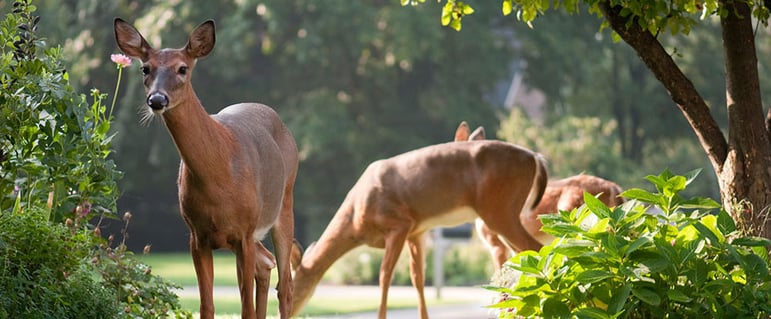
White-tailed deer are found throughout Massachusetts including Cape Cod and Martha's Vineyard. They are herbivores and consume a wide variety of herbaceous and woody plants native to the area.
An adult white-tailed deer requires approximately 5-7 lbs of food per day, and lawns unprotected by deer repellent are like a smorgasbord to them. Energy demands for white-tailed deer vary seasonally, and what deer eat can favor particular plants depending on the season, but these demands are the greatest during the autumn rut and severe winter weather.
The plants that deer favor can be annuals, perennials, and trees/shrubs. Common deer favored annuals include Asters, Coleus, Cosmos, Dahlia, Geranium, Gerbera Daisy, Impatiens, Morning Glory, Pansies, Violets, Petunia, and Sunflowers. The list for of deer-favored perennials include Autumn Joy Sedum, Canterbury Bells, Clematis, Crocus, Daylily, English Ivy, Grape Hyacinths, Hosta, Lilies, Lilyturf, Phlox, Rose Mallow, Strawberry, and Tulips.
As for trees and shrubs, deer favor American Arborvitae, Apple, Aucuba, Azalea, Blackberry & Raspberry, Camellia, Cherries, Eastern Redbud, Fatsia, Hydrangea, Indian Hawthorn, Norway Maple, Plum, Rhododendrons, Rose of Sharon, Roses, Winged Euonymus, Wintercreeper, and Yews.
Meanwhile, there are plants that are known to deter deer due to the taste or smell naturally. We refer to these as "deer resistant plants." A list of common deer resistant plants include:
- French Marigold
- Foxglove
- Rosemary
- Mint
- Crape Myrtle
- African Lily
- Fountain Grass
- Hens and Chicks
- Heliotrope
- Heather
- Yucca
- Zinnia
- Brunnera
- Wisteria
- Asparagus
- Sea Holly
- Verbena
- Sweet Woodruff
- Catmint
- Lamb's Ear
- Lily of the Valley
- Bee Balm
- Lungwort
- Daffodils
Unfortunately, if the deer are desperate for food, they will eat anything that isn’t poisonous to them. Deer resistant plants and a deer repellent program work together to naturally deter deer and prevent deer damage over time from a property so they do not come near your home in search of food.
Click the button below for more on how to naturally repel deer from your lawn:


